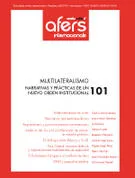Narratives of multilateralism: “Rashomon effect” and change of power

The effective multilateralism has become a commonplace feature in international political discourse. However, multilateralism is a puzzling concept and practice, and it is not conceived or interpreted in the same way by different international actors. While the United States continues to push “hegemonic multilateralism”, the EU is involved in “normative multilateralism”, the Global South has opted for “defensive multilateralism” and emerging countries promote “revisionist multilateralism”. They are all based on differentiated narratives, discursive legitimation, objectives and practices. The article attempts to characterize each of these reviews from their narratives and discursive logic. This argument used is the socalled “Rashomon effect”, based on the eponymous film by Akira Kurosawa, showing how different stories concerning a particular event can coexist, and how they establish the expectations, roles and behaviours of the actors involved. Finally, the article analyses how these narratives are affected by the process of power shift of the international system and calls for a common ground.
Key words: multilateralism, power politics, hegemony, emerging countries
>> The full text articles of this issue are available only in Spanish language.